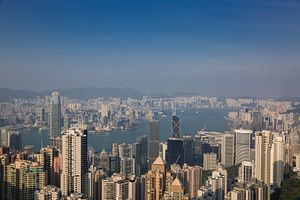China is currently holding its 15-day national “Two Sessions” — the annual plenary sessions of the National People’s Congress (NPC) and the National Committee of the Chinese People’s Political Consultative Conference (CPPCC) — in Beijing. While the whole world is focusing most its attention on the Chinese Communist Party (CCP) decision to scrap the two-term limit for the presidency in China’s constitution, the delegates from Hong Kong have noticed other developments equally, if not more, concerning for the future of their autonomous hometown. In the Two Sessions, multiple CCP top officials have warned Hong Kong that if the city doesn’t behave well in the future, the central government will increase its pressure.
On March 3, Yu Zhengsheng, chairman of the 12th CPPCC National Committee, delivered a work report to 2,149 political advisers. In the part of this report dealing with “suggestions for future work,” Yu didn’t mention that the central authority will fully implement the principles of “one country, two systems,” “Hong Kong people administering Hong Kong,” and a high degree of autonomy — all of which were traditional, must-have references in the past. Instead, Yu simply said that the central authority will “strengthen solidarity and friendship with compatriots from Hong Kong, Macao, and Taiwan, and mobilize the sons and daughters of the Chinese nation to share the national righteousness and realize the China dream.”
Yu’s tiny change in wording within his 10,000-word work report didn’t catch too much attention until Chinese Premier Li Keqiang made a similar omission when he delivered his work report on March 5 in front of nearly 3,000 NPC deputies at the Great Hall of the People. While he mentioned the principle of “one country, two systems,” Li eliminated the other two — “Hong Kong people administering Hong Kong” and a high degree of autonomy — in his report.
To send an even clearer message, the CCP sent two top officials to the Hong Kong delegates for separate face-to-face talks. Zhao Leji and Wang Huning, both members of China’s all-powerful Politburo Standing Committee, separately attended two panel discussions of the delegates from Hong Kong and Macau. According to multiple Hong Kong media outlets, both officials have used an unusually harsh tone to discuss Hong Kong.
“Using the high degree of autonomy to reject, fight, and erode the central government’s comprehensive jurisdiction is absolutely not allowed,” Zhao told the delegates to the CPPCC, since such activities touch upon Beijing’s “bottom line,” according to South China Morning Post.
Wang made a similar point, but with an harder stance. Wang’s meeting with Hong Kong delegates was not open to the press, but Wong Yuk-Shan, a spokesperson for Hong Kong delegates to the NPC, later told the media that Wang had spoken about five wishes for Hong Kong.
Specifically, according to Wong, Wang mentioned that “there were some illegal acts in Hong Kong society – the so-called Hong Kong independence – and the central government has zero tolerance for it.” These acts “must be dealt with sternly, or even with a heavy blow.” Wang also emphasized that Hong Kong “should understand the central government has overall jurisdiction. Harming the Basic Law and the long term stability of Hong Kong is prohibited.”
As The Diplomat has been following, tensions between Hong Kong and Beijing have been increasing in recent years. In September last year, for example, a series of disputes involving anti-China and pro-independence sentiments broke out in multiple universities in Hong Kong. These incidents not only further divided Hong Kong society but triggered controversies nationwide.
Based on the CCP’s latest message, Beijing has made up its mind to carry out a strong policy against Hong Kong.

































